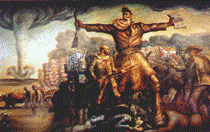History, Department of

James A. Rawley Graduate Conference in the Humanities
Date of this Version
April 2008
Document Type
Article
Abstract
This paper will primarily call into question the components of the ‘commanding’ vernacular religious culture in Reformation England between the years 1540 and 1559 and relate them to the strengthening of English ‘national consciousness’. The analysis will take into consideration early Anglican sermons as examples of this vernacular religious culture. The preachers whose sermons will be put into question in this analysis are Hugh Latimer and Thomas Lever whose motives to preach in the way they did will also be elucidated by other important documents. As for the starting assumptions of the concepts of ‘nation,’ ‘nationalism,’ and ‘national sentiment or consciousness,’ Anthony Smith, the influential theorist of nationalism studies, will be our beacon, especially having considered his emphasis on the pre-existing cultures which supposedly contributed to the formation of modern nationalism(s). Keeping in mind the directions of Smith, we will also be taking a look at the common myths or other ties which unified the English nation and bolstered up the emergence of English national consciousness. Throughout the analyses, the particular focus will be put on the role and efficiency of the state apparatus which used this vernacular religious culture as a tool of disseminating a discourse aimed at constituting national unity and consciousness.


Comments
Paper presented at the 3rd Annual James A. Rawley Conference in the Humanities — Imagining Communities: People, Places, Meanings. Lincoln, Nebraska, April 12, 2008. Sponsored by the University of Nebraska–Lincoln History Graduate Students’ Association. Copyright © 2008 Ramazan Hakki Oztan.